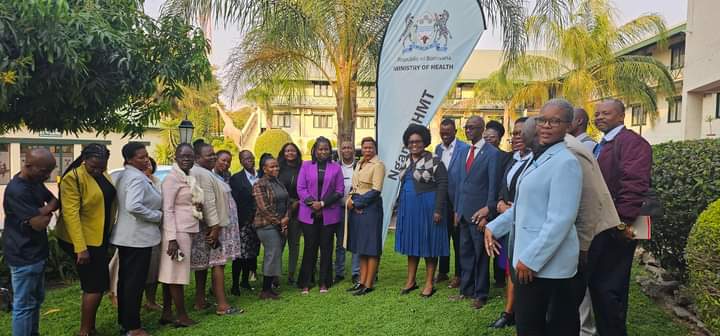𝙉𝙊𝙍𝙏𝙃𝙒𝙀𝙎𝙏 𝘿𝙃𝙈𝙏 𝙎𝙏𝘼𝙁𝙁 𝙈𝙀𝙈𝘽𝙀𝙍𝙎 𝙏𝙍𝘼𝙄𝙉𝙀𝘿 𝙊𝙉 𝘾𝙐𝙎𝙏𝙊𝙈𝙀𝙍 𝘾𝘼𝙍𝙀
A team of Public Relations Officers from the Ministry of Health Headquarters led by Dr Christopher Nyanga, conducted a two days customer care training workshop to equip staff members with proper techniques and best practices to deal with customers.
Dr Sandra Maripe, expressed her delight in her welcome remarks. “I am humbled and thrilled as today’s training touches on one of the critical values of the Ministry of Health- customer focus”
When addressing staff members, Dr Nyanga pleaded with staff members to always 𝒔𝒆𝒓𝒗𝒆 𝒄𝒖𝒔𝒕𝒐𝒎𝒆𝒓𝒔 𝒘𝒊𝒕𝒉 𝒄𝒐𝒖𝒓𝒕𝒆𝒔𝒚, 𝒐𝒏-𝒕𝒊𝒎𝒆 𝒂𝒏𝒅 𝒄𝒐𝒎𝒎𝒖𝒏𝒊𝒄𝒂𝒕𝒆 𝒇𝒆𝒆𝒅𝒃𝒂𝒄𝒌 𝒕𝒐 𝒕𝒉𝒆 𝒄𝒖𝒔𝒕𝒐𝒎𝒆𝒓. He underscored that a “ happy customer is the pillar of every successful organisation and an upset customer is a threat to the success of any business.”
Topics covered included: 𝒆𝒇𝒇𝒆𝒄𝒕𝒊𝒗𝒆 𝒄𝒐𝒎𝒎𝒖𝒏𝒊𝒄𝒂𝒕𝒊𝒐𝒏, 𝒄𝒐𝒏𝒇𝒍𝒊𝒄𝒕 𝒓𝒆𝒔𝒐𝒍𝒖𝒕𝒊𝒐𝒏 𝒂𝒏𝒅 𝒕𝒆𝒍𝒆𝒑𝒉𝒐𝒏𝒆 𝒆𝒕𝒊𝒒𝒖𝒆𝒕𝒕𝒆.
When closing, Head of Preventative Dr Keabetswe Solomon, conveyed special thanks and appreciation to the office of the Coordinator and Public Relations Unit for organising the training workshop. In the end Dr Solomon challenged all the participants to value feedback from customers and always treat them with respect .
Ministry of Health of Botswana







OTHER ARTICLES
Editorial — Prevent, inform, and act for women’s health in Africa
Kenya : Government Prioritises Maternal Health and Strengthens Support for Community Health Promoters
Strengthening pandemic prevention, preparedness, and response capacities in Senegal using the “One Health” approach